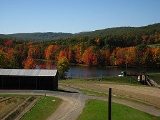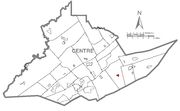
Spring Mills, Pennsylvania
Encyclopedia
Spring Mills is a census-designated place
(CDP) in Centre County
, Pennsylvania
, United States
. It is part of the State College, Pennsylvania
Metropolitan Statistical Area. The population was 289 at the 2000 census.
, the CDP has a total area of 0.5 square miles (1.3 km²), all of it land.
of 2000, there were 289 people, 105 households, and 78 families residing in the CDP. The population density
was 622.2 people per square mile (242.6/km²). There were 110 housing units at an average density of 236.8/sq mi (92.3/km²). The racial makeup of the CDP was 99.65% White and 0.35% Asian. Hispanic or Latino of any race were 0.35% of the population.
There were 105 households out of which 28.6% had children under the age of 18 living with them, 65.7% were married couples
living together, 5.7% had a female householder with no husband present, and 25.7% were non-families. 19.0% of all households were made up of individuals and 11.4% had someone living alone who was 65 years of age or older. The average household size was 2.75 and the average family size was 3.26.
In the CDP the population was spread out with 23.2% under the age of 18, 8.7% from 18 to 24, 27.0% from 25 to 44, 26.0% from 45 to 64, and 15.2% who were 65 years of age or older. The median age was 38 years. For every 100 females there were 99.3 males. For every 100 females age 18 and over, there were 94.7 males.
The median income for a household in the CDP was $43,750, and the median income for a family was $52,083. Males had a median income of $31,591 versus $25,357 for females. The per capita income
for the CDP was $17,832. About 2.4% of families and 3.2% of the population were below the poverty line, including 5.3% of those under the age of eighteen and none of those sixty five or over.

Census-designated place
A census-designated place is a concentration of population identified by the United States Census Bureau for statistical purposes. CDPs are delineated for each decennial census as the statistical counterparts of incorporated places such as cities, towns and villages...
(CDP) in Centre County
Centre County, Pennsylvania
Centre County is a county located in the U.S. state of Pennsylvania. It is part of the State College, Pennsylvania Metropolitan Statistical Area. As of 2010, the population was 153,990....
, Pennsylvania
Pennsylvania
The Commonwealth of Pennsylvania is a U.S. state that is located in the Northeastern and Mid-Atlantic regions of the United States. The state borders Delaware and Maryland to the south, West Virginia to the southwest, Ohio to the west, New York and Ontario, Canada, to the north, and New Jersey to...
, United States
United States
The United States of America is a federal constitutional republic comprising fifty states and a federal district...
. It is part of the State College, Pennsylvania
State College, Pennsylvania
State College is the largest borough in Centre County in the U.S. state of Pennsylvania. It is the principal city of the State College, Pennsylvania Metropolitan Statistical Area which encompasses all of Centre County. As of the 2010 census, the borough population was 42,034, and roughly double...
Metropolitan Statistical Area. The population was 289 at the 2000 census.
Geography
According to the United States Census BureauUnited States Census Bureau
The United States Census Bureau is the government agency that is responsible for the United States Census. It also gathers other national demographic and economic data...
, the CDP has a total area of 0.5 square miles (1.3 km²), all of it land.
Demographics
As of the censusCensus
A census is the procedure of systematically acquiring and recording information about the members of a given population. It is a regularly occurring and official count of a particular population. The term is used mostly in connection with national population and housing censuses; other common...
of 2000, there were 289 people, 105 households, and 78 families residing in the CDP. The population density
Population density
Population density is a measurement of population per unit area or unit volume. It is frequently applied to living organisms, and particularly to humans...
was 622.2 people per square mile (242.6/km²). There were 110 housing units at an average density of 236.8/sq mi (92.3/km²). The racial makeup of the CDP was 99.65% White and 0.35% Asian. Hispanic or Latino of any race were 0.35% of the population.
There were 105 households out of which 28.6% had children under the age of 18 living with them, 65.7% were married couples
Marriage
Marriage is a social union or legal contract between people that creates kinship. It is an institution in which interpersonal relationships, usually intimate and sexual, are acknowledged in a variety of ways, depending on the culture or subculture in which it is found...
living together, 5.7% had a female householder with no husband present, and 25.7% were non-families. 19.0% of all households were made up of individuals and 11.4% had someone living alone who was 65 years of age or older. The average household size was 2.75 and the average family size was 3.26.
In the CDP the population was spread out with 23.2% under the age of 18, 8.7% from 18 to 24, 27.0% from 25 to 44, 26.0% from 45 to 64, and 15.2% who were 65 years of age or older. The median age was 38 years. For every 100 females there were 99.3 males. For every 100 females age 18 and over, there were 94.7 males.
The median income for a household in the CDP was $43,750, and the median income for a family was $52,083. Males had a median income of $31,591 versus $25,357 for females. The per capita income
Per capita income
Per capita income or income per person is a measure of mean income within an economic aggregate, such as a country or city. It is calculated by taking a measure of all sources of income in the aggregate and dividing it by the total population...
for the CDP was $17,832. About 2.4% of families and 3.2% of the population were below the poverty line, including 5.3% of those under the age of eighteen and none of those sixty five or over.


